Freedom & Sovereignty
The Determinist's Resolution

What is free will? If our paths are predestined, how can we say that we make choices? Many different philosophers and religious movements have attempted to answer these questions over the millenia.
The issue became of great concern to Christian philosophy in the wake of the Protestant Reformation, especially the Reformed (or Calvinist) movement. Here's an elegant summary:
Determinism, Free will and Predestination - Reformation and Counter-Reformation
Of vital importance is the way in which we make decisions. Let's encapsulate everything in the universe -- the decider's body and spirit and everything around him -- into a "starting path." How do decisions affect that starting path to yield an ending path?
The person who hasn't thought very much about these issues usually imagines that there are any number of actual paths that may happen:

The problem is that if these ending paths are mutually exclusive with one another, it doesn't make sense to say that they are all "actual." Only one can actually happen. Realizing this, some people gravitate toward Fatalism. Fatalism says that there's only one actual resultant path for any starting path, and thus nothing we do really matters:
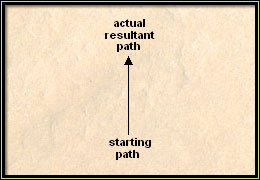
But there's a problem with this view as well, because even though there's only one actual resultant path for any starting path, the fact is that the actions we take, as products of our decisions, are efficacious. In other words, the stuff we do accomplishes things. We can conceive of imaginary worlds in which we choose to flee instead of fight, for instance, and recognize that our decisions helped dictate the direction of the actual path.
The solution is to place the path tree appropriately within a person's decisionmaking process:
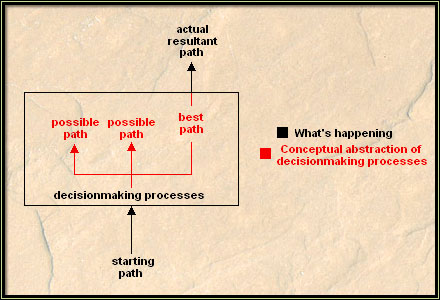
Now that we have a framework to meaningfully talk about decisionmaking, we come to a philosophical fork in the road. There are many different camps, but I'll cover the main two: Determinism and Libertarianism.
The first is Determinism. Determinism says that everything about you from a moment ago, body and spirit, can be considered part of the starting path:
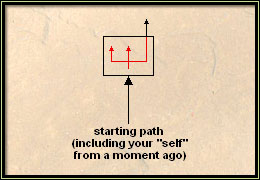
The second is Libertarianism. Fans of Libertarian (not the political party!) freedom don't like the idea of the outcome being rigidly dictated by the income. They consider it a violation of freedom to say that "my present self" is bound by "my self, a moment ago." In order to sever this rigid binding, Libertarians throw in extra variables that might affect the decisionmaking process. One possible extra variable is true, uncaused random anomaly (the Copenhagen interpretation of quantum mechanics, one of two such interpretations, says that this is possible):
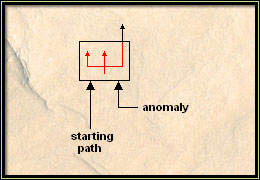
But it seems unreasonable to say that randomness would contribute to free will rather than taking away from it. Aren't I more free when a decision is entirely "my doing" rather than "my doing plus a coin flip?" So this "extra variable" doesn't seem to work, and few Libertarians are satisfied with it. The other proposed extra variable is the "transcendent self":
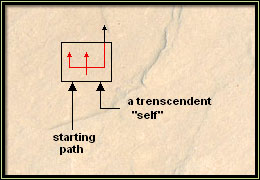
This interpretation says that part of our "self" actually transcends the cause-and-effect progression. Determinists complain that this "transcendent self" has never been coherently defined, and thus this extra variable has never been coherently proposed.
Now, it's important to realize that many folks don't see the need, as Libertarians do, to find extra variables in order to keep hold of the notion of free will. Those folks are called "Deterministic Compatibilists."
Compatibilism asks, "When you say free will, what are you saying the will is free from?" Nothing is free in a vacuum -- a free thing is free from something. "Buy one, get one free" really means "Buy one, get one free of cost," for instance.
Compatibilists don't have a problem saying that our decisions are dictated by ourselves, a moment in the past. Nor do they take issue with defining ourselves as non-transcendent actors composed of caused-and-formed matter and spirit. Compatibilists claim that this definition is not a violation of the kind of freedom we mean when we say "free will." After all, who would say that a man is meaningfully "oppressed" by his self? I guess one could consider it true in a sense, but is it really meaningful? No way!
Compatibilists say that our will can, circumstantially, be free of gross, external oppression, and that this is what we mean when we say "free will." Our will can be free of imposition by other agents.
A Compatibilistic viewpoint should be extremely attractive to Christians, because it solves the apparent conflict between sovereignty and free choice. Yes, our paths are predestined; but still, our choices are meaningful and efficacious. Yes, God governs the universe completely; but still, our wills are (often) free of proximal oppression.
And a Compatibilistic viewpoint is in perfect harmony with Scripture, which sometimes refers to the divine perspective (Prov 21:1, Eph 2:4-10, Rom 8 & 9, 2 Tim 1:9), while at other times refers to proximal human experience (Deut 30:19, Josh 24:15, Prov 3:31, Phil 1:14, James 4:17, Rev 22:17).

In the Truth Project, Dr. Del Tackett takes a Libertarian position, appealing to the "transcendent self." Yet in Tour 6, he rightfully acknowledges that "self-transcendence" is challenged by the fact that God has a sovereign plan in motion. Instead of attempting to resolve this challenge, he simply accepts it as one of the Scriptural paradoxes.
The problem is that, in many cases, Scriptural paradoxes are intended to be resolved. Many Scriptural paradoxes are statements that subtly change contexts in order to present truth in a way that poetically appears to be contradictory. The key difference between a paradox and a contradiction is that paradoxes can potentially be resolved by contemplating the shifting context. In this way, paradoxes can challenge the listener, but the listener benefits by being compelled to think more deeply. We do a disservice to such passages when we let them "stay mere contradictions."
In his second letter to the Corinthians, Paul writes "When I am weak, then I am strong." Is this a contradiction? No, because the two qualities are under different senses, or contexts. Paul was saying that he was strong in the power and Grace of Christ due to the fact that he had personal failings and underwent hardships; "When I am weak [personally], then I am strong [in Christ]."
Every Scriptural paradox can be resolved by examining the shifting context. And the Compatibilistic interpretation of Determinism does just that, elegantly resolving the paradox of sovereignty and human freedom.
In tour 2, Del Tackett falsely tells the attendees that Determinism says we have "no knowledge." In Tour 3, he explicitly proclaims Determinism to be wrong and balks at the causal necessity of what occurs in the past.
In promoting his personal certainty in the Libertarian view of freedom despite the fact that he knows it's problematic, Dr. Tackett burns the bridge on an effective philosophical tool -- a tool that brings seemingly-conflicting Scriptural concepts together as a cohesive unit.

(c) 2009 The Truth Problem.
|